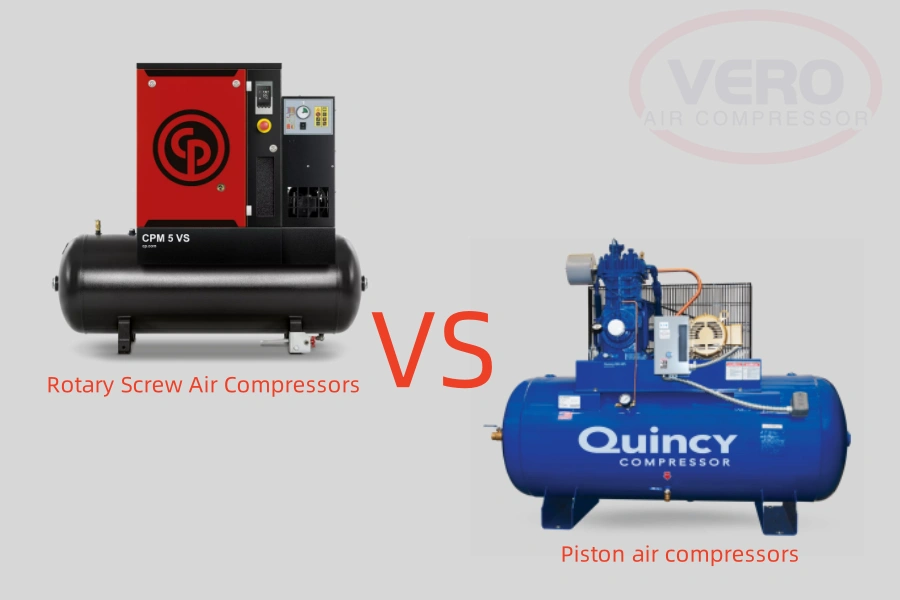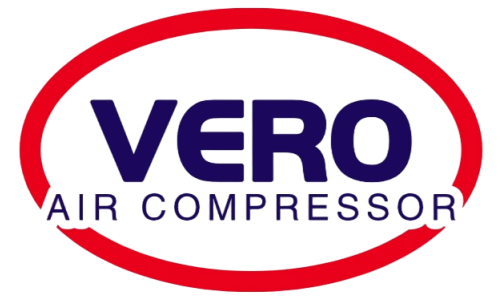When selecting an air compressor for your business, the decision often comes down to two popular types: piston (reciprocating) compressors and rotary screw compressors. While both have their unique strengths, understanding their differences and evaluating your specific application needs is essential to make the right choice.
This comprehensive guide will help you identify the best option for your business, based on key factors like cost, efficiency, duty cycle, noise levels, and maintenance requirements.

Table of Contents
ToggleKey Questions to Ask Before Choosing a Compressor
Before diving into the technical details of piston and rotary screw compressors, take a moment to evaluate your needs:
- What is the primary application for the compressor?
- How much air flow (CFM) does my operation require? For example, small tools may require 4-5 CFM, while industrial processes might demand over 100 CFM.
- What pressure (PSI) does my facility or equipment need? Common operating pressures range from 90-125 PSI for most tools, while some specialized applications might need higher pressures.
- Do I need clean, dry air (e.g., with filters and dryers)? Certain industries, such as food processing or electronics, require air with minimal contaminants.
- How many hours per year will the compressor run? Frequent or continuous operation can influence your choice.
- Is my operation single-shift or multi-shift?
- Are there fluctuations in demand throughout the day? If so, a variable speed drive (VSD) compressor might save costs.
- Are there plans for expansion or increased capacity in the future?
Answering these questions provides a solid foundation for determining whether a piston or rotary screw compressor is the right fit.
Piston Compressors vs. Rotary Screw Compressors: A Detailed Comparison
Initial Cost vs. Long-Term Costs
- Piston Compressors: Typically have a lower upfront cost, making them attractive for budget-conscious buyers or applications with limited usage. For example, a 10 HP piston compressor might cost $3,000–$5,000.
- Rotary Screw Compressors: Higher initial investment, ranging from $7,000–$15,000 for a 10 HP model, but significantly lower operating costs over their lifespan due to better energy efficiency and reduced maintenance.
Energy Efficiency
- Piston Compressors: Consume more energy due to their intermittent operation and higher friction losses. Their specific power consumption can range from 5.5–6.5 kW per 100 CFM.
- Rotary Screw Compressors: Far more energy-efficient, with specific power consumption as low as 4.0–5.0 kW per 100 CFM, making them ideal for continuous operation.
Duty Cycle
- Piston Compressors: Limited duty cycle, typically around 60-70%, meaning they need downtime to cool between cycles. They are best suited for short bursts of air supply or low daily usage.
- Rotary Screw Compressors: Designed for continuous operation with a 100% duty cycle. They can run 24/7 without overheating, making them ideal for demanding industrial environments.
Noise Levels
- Piston Compressors: Can be quite noisy, often exceeding 80-90 decibels. Additional soundproofing may be required in sensitive environments.
- Rotary Screw Compressors: Operate at much lower noise levels, typically between 65-75 decibels, thanks to enclosed designs and quieter technology.
Maintenance Requirements
- Piston Compressors: Have more moving parts, such as pistons and rings, which are subject to higher wear and tear. Maintenance intervals may be as frequent as every 500-1,000 operating hours.
- Rotary Screw Compressors: Feature fewer moving parts and experience less friction, resulting in maintenance intervals of 2,000–4,000 hours or more, depending on the model.
Air Quality
- Piston Compressors: May produce air with higher oil and moisture content, which could require additional filtration for sensitive applications. Typical oil carryover might be 5-10 ppm.
- Rotary Screw Compressors: Provide consistent, cleaner air with fewer contaminants, often achieving oil carryover levels below 3 ppm. This makes them ideal for industries like food processing and pharmaceuticals.
When to Choose a Piston Compressor
- Low-Duty Applications: Perfect for occasional use or short bursts of air, such as in small workshops or hobbyist settings.
- Budget Constraints: Ideal for businesses with limited budgets and low operating hours.
- Noisy Environments: In settings where noise levels are not a concern, such as industrial plants.
When to Choose a Rotary Screw Compressor
- High-Duty Applications: Best for continuous operation and high air demand, such as in manufacturing plants or automotive production lines.
- Energy Savings: Great for businesses looking to reduce energy costs and improve operational efficiency.
- Quiet Operations: Essential in environments like hospitals or laboratories where noise levels must be kept to a minimum.
Additional Considerations
- Future Expansion: If you anticipate growing your business or increasing air demand, investing in a rotary screw compressor can save on future costs.
- Variable Speed Drive (VSD): For applications with fluctuating air demand, a VSD rotary screw compressor can significantly reduce energy costs by adjusting its output to match the demand.
- Space and Portability: Piston compressors are often more compact and portable, while rotary screw compressors require more space and are typically stationary.
Conclusion
Choosing the right air compressor depends on understanding your application’s requirements and balancing factors like cost, efficiency, and long-term performance.
At Vero AirCompressor, we specialize in helping businesses find the perfect solution for their needs. Whether you’re considering a reliable piston compressor for light-duty tasks or a high-performance rotary screw compressor for continuous use, our team is here to guide you every step of the way.
Contact us today for expert advice and access to the industry’s best air compressors at wholesale prices.
